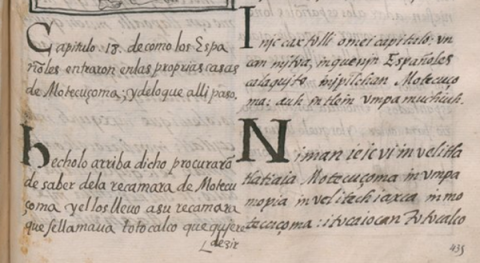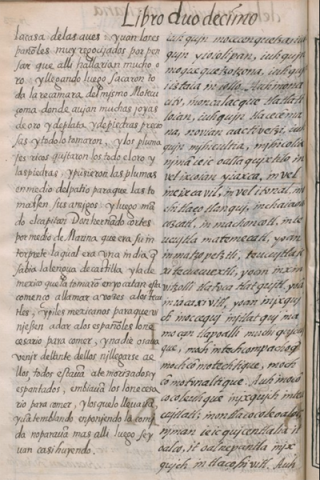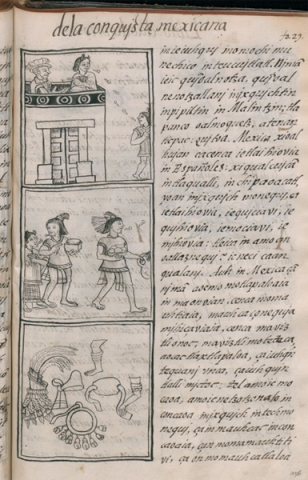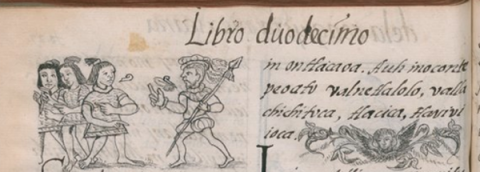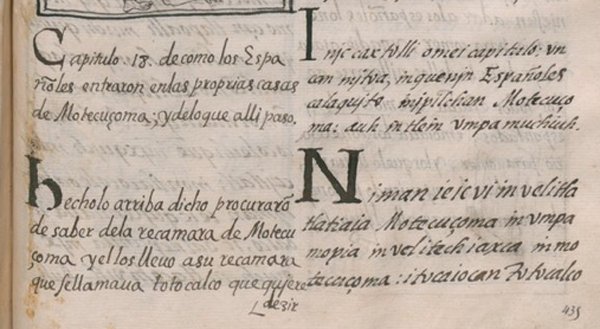 |
[Transcription of the Nahuatl (right-hand column) by James Lockhart:]
[f. 28r., cont.] Inic caxtolli omei capitulo: vncan mitoa, in quenin Españoles calaquito in ipilchan Motecuçoma: auh in tlein vmpa muchiuh.
Niman ie ic vi in vel itlatlatiaia Motecuçoma in vmpa mopia in vel itech iaxca in motecuçoma: itocaiocan Totocalco
|
[Translation of the Nahuatl (right-hand column) by James Lockhart:]
Eighteenth chapter, where it is said how the Spaniards went into Moteucçoma’s personal home, and what happened there.
Thereupon they went to the place where Moteucçoma stored his own things, where all his special property was kept, called Totocalco.
[Translation of the Spanish (left-hand column) by James Lockhart:]
Chapter Eighteen, of how the Spaniards entered Moteucçoma's private home, and what happened there.
When the above had been done, [the Spaniards] attempted to find out about the special storehouse of Moteucçoma, and he took them to his storehouse, named Totocalco, which means
|
[Translation of the Nahuatl into Spanish by Fr. Bernardino de Sahagún; transcription of the Spanish (left-hand column) by James Lockhart:]
[f. 28r., cont.] Capitulo .18. de como los Españoles entraron en las proprias casas de Motecuçoma; y de lo que alli paso.
Hecho lo arriba dicho procurarō de saber de la recamara de Motecuçoma y el los lleuo a su recamara que se llamaua totocalco que quiere dezir
|
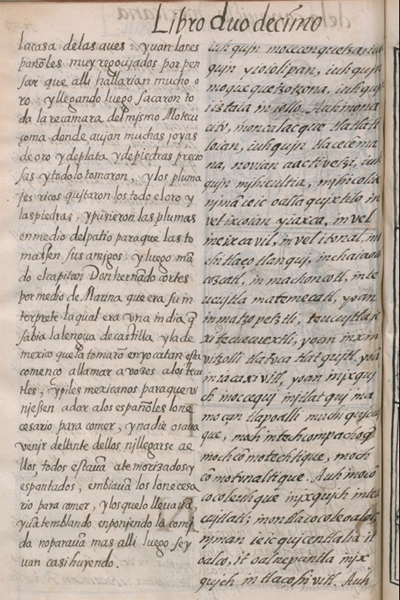 |
[Transcription of the Nahuatl (right-hand column) by James Lockhart:]
[f. 28v.] iuhquin mocecenquetza, iuhquin yioiolipan, iuhquin moquequetzotzona, iuhquin iiztaia iniollo.* Auh in onacito, in oncalacque tlatlatiloian, iuhquin tlacecēmana, novian aactivetzi, iuhquin mihicultia, mihicolia: nimā ie ic oallaquixtilo in vel ixcoianyiaxca, in vel ineixcavil, in vel itonal, mochi tlaçotlanqui, in chaiaoac cozcatl, in machoncotl, in teucuitlamatemecatl, yoan in matzopetztli, teucuitlaicxitecuecuextli, yoan in xinvitzolli** tlatocatlatquitl, yoā in iacaxivitl, yoan in ixquich in oc cequi in itlatqui in amoçan tlapoalli muchi quicuique, moch intech compachoq̄ moch cōmotechtique, moch cōmotonaltique. Auh in ocōcocoleuhque in ixquich in teucuitlatl; in ontlacocoleoaloc, niman ie ic quicentlalia itoalco, itoalnepantla inixquich in tlaçohivitl.
Auh
----------
*IUHQUIN MOCECENQUETZA, . . . IUHQUIN IIZTAIA INIOLLO. Three of these four idioms are extremely obscure in the context. It is mainly the Spanish version that gives one some sense of the thrust.
**XINVITZOLLI. Read “xivitzolli.” The n, however, probably represents the first, unvoiced portion of a geminate [w].
|
[Translation of the Nahuatl (right-hand column) by James Lockhart:]
It seemed that they <all bunched together>, were struck [with hope], patted each other on the back of the neck, their hearts brightening. And when they got there and went into the storage place, they seemed to disperse in all directions, quickly going in everywhere, as though covetous and greedy. Thereupon [Moteucçoma’s] own personal property was brought out, belonging to him alone, his own portion, all precious things: necklaces with pendants,arm bands with quetzal feathers, golden arm bands,bracelets, golden bands with shells for the ankles, and the turquoise diadem, insignia of the ruler, and the turquoise nose rods, and other things without number belonging to him. They took all of it; they appropriated it, assigned and apportioned it to themselves. And when they had taken off each and every piece of the gold,when it had been detached, then they assembled all the precious feathers in the courtyard, in the middle of the courtyard.
And
[Translation of the Spanish (left-hand column) by James Lockhart:]
"bird house." The Spaniards went along very joyfully, thinking that they would find much gold there; on arrival they took everything out of Moteuccoma's own storehouse, where there were many precious items of gold, silver, and precious stones, and they took it all. They removed all the gold and stones from the rich feather-pieces and put the feathers in the middle of the courtyard for their friends to take.
Then Captain don Hernando Cortés gave orders through Marina, who was his interpreter—she was an Indian woman who knew the languages of Castile and Mexico; they took her in Yucatan. She began to call loudly to the Mexica tecutles [lords] and piles [nobles] to come to give the Spaniards the necessary food.
But no one dared to come into their presence or approach them; they were all terrified and frightened. They sent them the necessary food, but those who carried it went trembling; when they put the food down, they tarried no longer, but immediately left, almost fleeing.
|
[Translation of the Nahuatl into Spanish by Fr. Bernardino de Sahagún; transcription of the Spanish (left-hand column) by James Lockhart:]
[f. 28v.] la casa de las aues: yuan los españoles muy regocijados por pensar que alli hallarian mucho oro: y llegando luego sacaron toda la recamara del mismo Motecuçoma donde auian muchas joyas de oro y de plata y de piedras preciosas y todo lo tomaron, y los plumajes ricos quitaronlos todo el oro y las piedras, y pusieron las plumas en medio del patio para que las tomassen sus amigos:
y luego mādo el capitan Don hernādo cortes por medio de Marina que era su interprete la qual era vna india q̄ sabia la lengua de castilla y la de mexico que la tomarō en yocatan esta començo a llamar a vozes a los Tecutles, y piles mexicanos para que viniessen a dar a los españoles lo necesario para comer,
y nadie osaua venir delante dellos ni llegarse a ellos, todos estauā atemorizados y espantados, embiauālos lo necesario para comer, y los que lo lleuauā, yuā temblando en poniendo la comida no parauā mas alli luego se yuan casi huyendo.
|
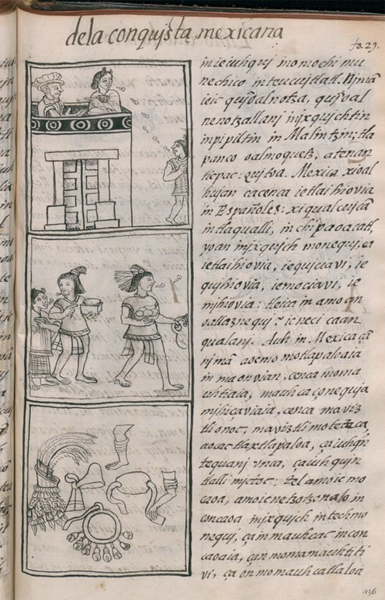 |
[Transcription of the Nahuatl (right-hand column) by James Lockhart:]
[f. 29r.] in ie iuhqui in o mochi munechico inteucuitlatl. Nimā ie ic quīoalnotza, quīoalnenotzallani in ixquichtin in pipiltin in Malintzin: tlapanco oalmoquetz,atenanticpac: Quitoa. Mexica xioalhuian ca cenca ie tlaihiovia in Españoles: xiqualcuicā* in tlaqualli, in chipaoac atl, yoan in ixquich monequi, ca ie tlaihiovia,ie quiciavi, ie quihiovia, ie mociavi, ie mihiovia: tleicain amo anoallaznequi? ic neci ca anqualani.
Auh in Mexica çā nimā aocmo motlapaloaia in ma onvian, cenca momauhtiaia, mauhcaçonequia mihiçaviaia, cenca maviztli onoc, maviztli moteteca, aocac tlaxtlapaloa, ça iuhq̓n tequani vnca, ça iuhquin tlalli mictoc: tel amo ic mocaoa, amo ic netzotzonalo in concaoa in ixquich intech monequi, ça in mauhcac** in concaoaia, çan momamauhtitivi, ça onmomauhcatlaloa
----------
*XIQUALCUICĀ. Read "xicualcuicā." It is not uncommon, however, to find qua representing standard chua.
**MAUHCAC. Apparently one is to read "mauhca."
|
[Translation of the Nahuatl (right-hand column) by James Lockhart:]
when the collection of all the gold was completed, thereupon Marina summoned to her, had summoned, all the noblemen. She stood on a flat roof, on a roof parapet, and said, “Mexica, come here, for the Spaniards are suffering greatly. Bring food, fresh water, and all that is needed, for they are suffering travail, are tired, fatigued, weary, and exhausted. Why is it you do not want to come? It is a sign that you are angry.”
But the Mexica no longer at all dared to go there. They were greatly afraid; they were limp with fear; they were taken aback. Fear greatly prevailed; it spread about. No one dared come out. It was as though a wild beast were loose, as though it were the deep of night. Yet there was not for that reason a halt or hesitation in delivering everything [the Spaniards] needed, but they delivered it fearfully, they went in fear, they ran in fear as they went to deliver it. And when they had spilled it on the ground, everyone came running back in a flash, panting and trembling.
[Translation of the Spanish (left-hand column) by James Lockhart:]
(intentionally blank)
|
[Translation of the Nahuatl into Spanish by Fr. Bernardino de Sahagún; transcription of the Spanish (left-hand column) by James Lockhart:]
[f. 29r., tres dibujos; sin texto en español]
|
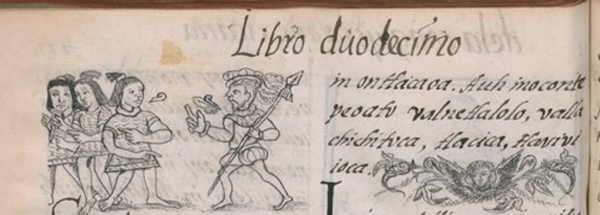 |
[Transcription of the Nahuatl (right-hand column) by James Lockhart:]
[f. 29v.] in ontlacaoa. Auh in ocontepeoato valnetlalolo,vallachichitoca, tlacica, tlaviviioca.
|
[Translation of the Nahuatl (right-hand column) by James Lockhart:]
as they went to deliver it. And when they had spilled it on the ground, everyone came running back in a flash, panting and trembling.
[Translation of the Spanish (left-hand column) by James Lockhart:]
(intentionally blank)
|
[Translation of the Nahuatl into Spanish by Fr. Bernardino de Sahagún; transcription of the Spanish (left-hand column) by James Lockhart:]
f. 29v., la parte de arriba; un dibujo; sin texto en español] |
